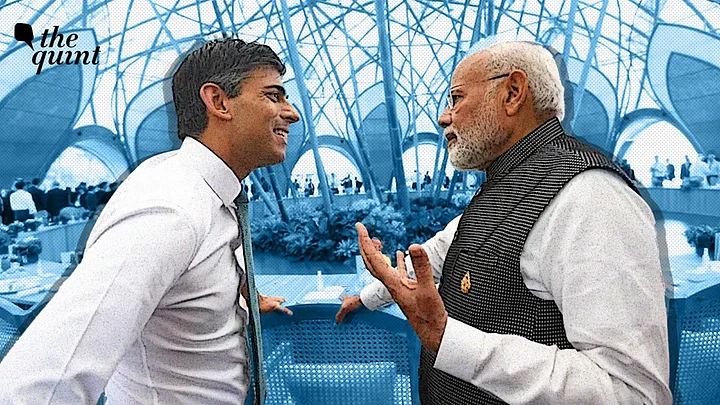As Indians have now claimed the UK Prime Minister as their own, India’s son-in-law Rishi Sunak met the Indian Prime Minister Narendra Modi for the first time on the sidelines of the G20 at Bali.
The African-Indian descent Sunak calmed the nerves of an upset India following Home Secretary Suella Braverman’s comments on Indians overstaying their visa.
While UK’s T20 cricket win could be seen as the Indian subcontinent’s ‘shagun ka lifafa’ as apart from India, Pakistan also seems to be owning him along with Africa. India’s damaad gave its in-laws’ country his first gift – a long-awaited visa deal. Sunak proffered an olive branch on visas to India, during the G20 meet in Bali by greenlighting 3000 two-year visas for young Indian professionals— a deal that was part of the original memorandum of understanding with India.
The same number of visas will be offered by India to Britons and will be available to people aged between 18 and 30. The scheme, plans for which were first announced last year, will open early next year.
Sunak’s India Outreach
An initial agreement on the UK-India Young Professionals Scheme was reached by then-home secretary Priti Patel in 2021 as part of a deal which will also make it easier for Britain to return individuals who overstay their visas.
However, Sunak has hinted he will slow down progress on the India trade deal to improve its terms, saying the UK should not “sacrifice quality for speed”, suggesting a noticeable change of approach from Boris Johnson and Liz Truss, who prioritised speed and hard deadlines, having pledged a “Deal for Diwali” that did not materialise.
Speaking to reporters joining him on his trip to the G20 summit, Sunak said a trade deal with India was “a fantastic opportunity for the UK” but he added: “I wouldn’t sacrifice quality for speed. And that goes for all trade deals. It’s important that we get them right, rather than rush them and so that’s the approach I’ll take.”
On UK-India Trade Deal
Notably, his remarks came after the former Environment Secretary George Eustice criticised the trade deal with Australia signed by Truss, saying it was “not actually a very good deal for the UK” and criticised her for having set “arbitrary targets” for the conclusion of an agreement.
In his strong criticism, Eustice also said the UK negotiator Crawford Falconer’s, (now the interim permanent secretary at the Department for International Trade) “advice was invariably to retreat and make fresh concessions and all the while, he resented people who understood technical issues greater than he did."
Reportedly, Sunak is keen to improve terms for the UK services sector via the India deal, but there are tensions within the UK government on the extent to which the UK should offer visa liberalisation. Nevertheless, the move represents an olive branch to Delhi, after an outraged Indian government put plans for an agreement on ice in response to Home Secretary Suella Braverman’s comments about Indian migrants.
Sunak’s Damage Control Measures to Suella’s Comments
It is being seen as a clear rebuff to Ms Braverman who provoked Delhi’s anger in October by saying she had “reservations” about more visas for Indians and claimed that overstayers from the subcontinent already pose a problem.
“I have concerns about having an open-border migration policy with India,” she told The Spectator. “I do have some reservations. Look at migration in this country – the largest group of people who overstay are Indian migrants.” In fact, it is believed her remarks were blamed for the cancellation of a mooted visit to the UK by the Indian Prime Minister Narendra Modi.
Announcing the visa scheme, Sunak said: “I know first-hand, the incredible value of the deep cultural and historic ties we have with India.
“I am pleased that even more of India’s brightest young people will now have the opportunity to experience all that life the UK has to offer – and vice versa – making our economies and societies richer.” But he was careful to reiterate that he did not expect it to trigger the swift conclusion of trade talks.
Indian Students in UK and Bilateral Ties
Nearly a quarter of international students in the UK are from India and trade with the country is worth £24 billion. The 10 Downing Street said the UK would agree to a bespoke, reciprocal route to give young professionals from the UK and India a once-in-a-lifetime opportunity to take part in a professional and cultural exchange.
Downing Street described it as “a significant moment both for our bilateral relationship with India and the UK’s wider commitment to forging stronger links with the Indo-Pacific region to strengthen both our economies”.
(Nabanita Sircar is a senior journalist based in London. She tweets at @sircarnabanita. This is an opinion piece and the views expressed above are the author’s own. The Quint neither endorses nor is responsible for the same.)
